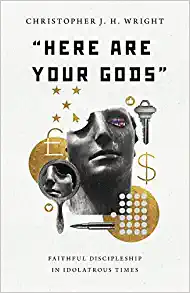
Christopher J. H. Wright
Reviewed by: David VanDrunen
“Here Are Your Gods:” Faithful Discipleship in Idolatrous Times, by Christopher J. H. Wright. IVP Academic, 2020. Paperback, 176 pages, $16.20. Reviewed by OP seminary professor David VanDrunen.
Christopher Wright’s newest book is both a study of idolatry and a lament over the sorry state of Western civilization. Wright believes that idolatry is the fundamental cause of our cultural decline. Part 1 addresses how Scripture speaks of idolatry and the relationship of idolatry to “Christian mission.” In part 2, Wright contemplates recent British and American political events in light of Scripture’s teaching about idolatry. Part 3 concludes by exploring how to live faithfully as God’s people in our present world.
There are several things to appreciate about this book. For example, the opening two chapters comment insightfully on how the Old Testament portrays idolatry. Wright also helpfully critiques as blasphemous the common American and British practice of invoking God’s name to sanctify national pride and military adventures. Finally, Wright provides good spiritual encouragement when emphasizing that God himself wins the victory in the battle against idolatry described in Scripture. We Christians are simply called to witness, struggle, resist, suffer, and serve.
In the midst of these helpful discussions, Wright’s book also raises issues that deserve critical reflection. I mention four.
First, the book utilizes some big, but highly debatable, theological claims that Wright has defended in previous works. One pertains to the mission of the church, which, according to Wright, includes not only evangelism and teaching but also working for justice, compassion, and environmental stewardship. Wright also claims that God intended Israel under the Mosaic law to be a model or paradigm of a godly society for all nations and cultures. I cannot engage these claims in a short review, but readers of this book should be prepared to think critically about them.
Second, in addition to his consideration of (literal) idolatry in the Old Testament, Wright also offers an expansive understanding of idolatry, particularly when turning to the New Testament. He believes idolatry involves both actual religious worship of false gods and all sorts of sinful desires (such as greed, pride, and lust), which take social form in the guise of nationalism, consumerism, militarism, etc. Wright is not alone in making idolatry a sort of all-embracing category, but I wonder if this conflates sins that deserve more careful distinction. To be sure, actual idolatry and the desires of the flesh are closely related (cf. Eph. 5:5; Col. 3:5). But how helpful is it to say: “The worship of Baal is alive and well in Western culture—with our idolizing of sex and money” (96)? The person whose greed leads him to offer sacrifices to Baal and the person whose greed leads her into a gambling addiction will probably need very different sorts of pastoral care.
Third, this is a culturally pessimistic book. Wright just about predicts the imminent end of Western civilization. Such books can helpfully remind us of the failings of our societies and warn us against complacency, but they can also easily fall into one-sided analyses of contemporary culture and do a better job provoking anger and despair than instilling gratitude and joy. Wright succumbs to these dangers, I fear, although he tries to pull back from them on occasion.
Finally, there’s the issue of what makes Wright so pessimistic. Wright views the 2016 Brexit vote as the great symbol of cultural decadence. He’s also distressed about Trump, cuts to the British welfare system, American gun ownership, and “capitalism.” Needless to say, not all Christian books announcing the collapse of Western civilization agree that those are the biggest worries. Readers inclined to be pessimistic will have to decide what to be pessimistic about. For my part, I wonder whether charity and unity among Christians might be better served if disagreements about the European Union or the Second Amendment weren’t viewed through the lens of idolatry.
January 25, 2026
January 18, 2026
January 11, 2026
Texts that Transform: Church and Ministry
January 04, 2026
December 28, 2025
December 21, 2025
December 14, 2025
© 2026 The Orthodox Presbyterian Church